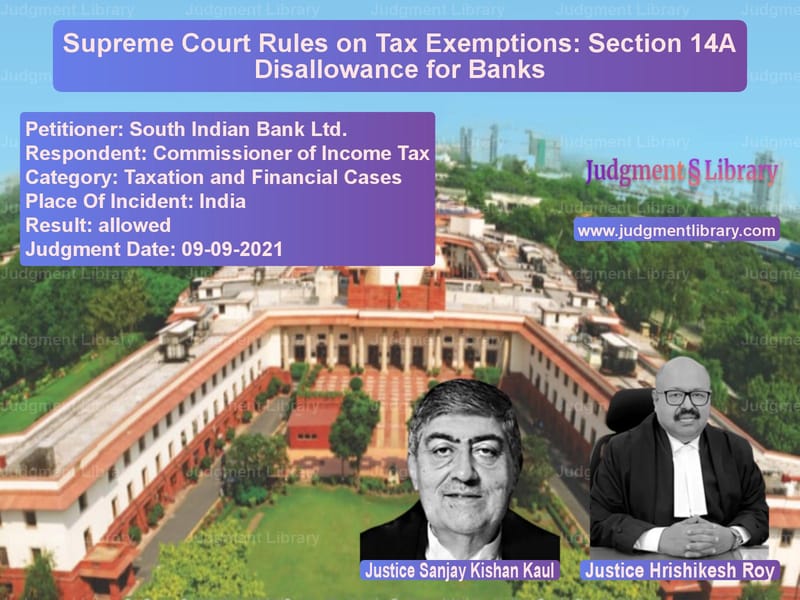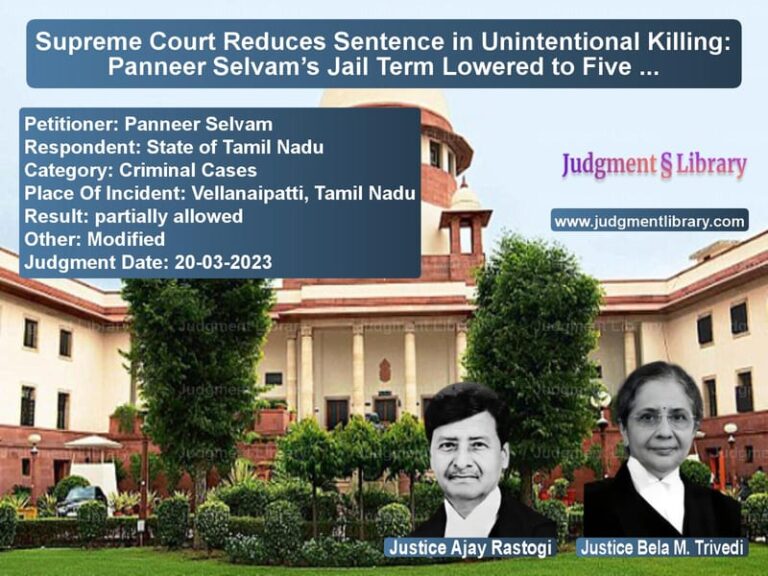Supreme Court Rules on Tax Exemptions: Section 14A Disallowance for Banks
The case of South Indian Bank Ltd. vs. Commissioner of Income Tax and other related appeals revolved around the interpretation of Section 14A of the Income Tax Act. The Supreme Court had to decide whether banks could be subjected to a proportionate disallowance of interest paid for investments in tax-free bonds and securities, despite having sufficient interest-free funds.
Background of the Case
The appellants in this case were scheduled banks that engaged in regular banking operations, including investments in tax-free bonds and securities. These investments earned the banks tax-exempt interest and dividend income. The Commissioner of Income Tax (CIT) sought to apply Section 14A of the Income Tax Act, which disallows expenditures incurred for earning tax-free income, to a proportionate portion of the interest paid by the banks.
The key legal question before the Court was:
“Whether proportionate disallowance of interest paid by banks is justified under Section 14A of the Income Tax Act when banks have sufficient interest-free funds that exceed the investments in tax-free securities?”
Legal Provisions Involved
Section 14A of the Income Tax Act was introduced to prevent taxpayers from claiming deductions for expenditures incurred to earn tax-free income. The section reads:
- No deduction shall be allowed for expenditure incurred in relation to income that does not form part of the total taxable income.
- The Assessing Officer must determine the amount of such expenditure using a prescribed method if not satisfied with the taxpayer’s claim.
- The provisions also apply where the taxpayer claims that no expenditure has been incurred to earn tax-free income.
Arguments by the Banks
The banks argued that:
- They had sufficient interest-free funds (such as reserves and current account deposits) to cover the investments made in tax-free securities.
- Interest-bearing funds were used for general banking operations, and no direct nexus between borrowed funds and tax-free investments was established.
- Investments in bonds and shares were part of the banks’ stock-in-trade rather than separate investment portfolios.
- The ITAT had ruled in favor of the banks, rejecting the proportionate disallowance, but the High Court had reversed this decision.
Arguments by the Income Tax Department
The Income Tax Department, represented by the Commissioner of Income Tax (CIT), contended that:
- Since banks did not maintain separate accounts for tax-free investments, a portion of the interest expenditure had to be disallowed.
- The CIT had computed the disallowance based on the average cost of deposits used for investments.
- The High Court had correctly applied Section 14A, ruling that the proportionate disallowance was justified.
Supreme Court’s Key Observations
1. Taxpayer’s Right to Appropriate Funds
The Supreme Court ruled that if a taxpayer has both interest-free and interest-bearing funds, it has the right to decide from which funds investments are made:
“Where the assessee has sufficient interest-free funds to cover tax-free investments, it must be presumed that the investments were made from such interest-free funds.”
2. Absence of a Statutory Obligation to Maintain Separate Accounts
The Court found that the Income Tax Department failed to prove any statutory requirement for banks to maintain separate accounts for tax-free investments:
“There is no statutory provision compelling banks to maintain separate accounts for tax-free investments. In the absence of such an obligation, proportionate disallowance cannot be justified.”
3. ITAT’s Interpretation Was Correct
The Supreme Court upheld the ITAT’s view that since banks function with indivisible funds, investments should not be arbitrarily linked to borrowed capital.
4. CBDT Circular No. 18 of 2015
The Court referred to a Circular issued by the Central Board of Direct Taxes (CBDT) in 2015, which clarified that investments made by banks are treated as stock-in-trade, not separate investment portfolios. This reinforced the banks’ argument that Section 14A should not apply.
Final Judgment
The Supreme Court ruled in favor of the banks and held that:
- The proportionate disallowance under Section 14A was not justified for banks that had sufficient interest-free funds.
- The ruling of the ITAT was reinstated, and the High Court’s decision was set aside.
- The Income Tax Department cannot disallow interest expenses solely based on the assumption that all investments are made from borrowed funds.
Implications of the Judgment
This ruling has significant implications for the banking sector and taxation:
1. Relief for Banks
The judgment provides clarity on tax exemptions for banks, ensuring that investments in tax-free securities do not lead to arbitrary disallowances.
2. Consistency in Tax Treatment
The decision reinforces the principle that interest-free reserves and deposits should be considered before applying Section 14A.
3. Legal Precedent for Future Cases
The ruling serves as a precedent for other financial institutions and companies that make tax-free investments while having sufficient interest-free funds.
Conclusion
The Supreme Court’s decision in South Indian Bank Ltd. vs. Commissioner of Income Tax is a landmark ruling that clarifies the application of Section 14A. By ruling that proportionate disallowance of interest is not justified when a bank has sufficient interest-free funds, the Court has provided much-needed relief to financial institutions. This judgment ensures that taxation remains fair and prevents unnecessary litigation over disallowances based on assumptions rather than factual analysis.
Petitioner Name: South Indian Bank Ltd..Respondent Name: Commissioner of Income Tax.Judgment By: Justice Sanjay Kishan Kaul, Justice Hrishikesh Roy.Place Of Incident: India.Judgment Date: 09-09-2021.
Don’t miss out on the full details! Download the complete judgment in PDF format below and gain valuable insights instantly!
Download Judgment: south-indian-bank-lt-vs-commissioner-of-inco-supreme-court-of-india-judgment-dated-09-09-2021.pdf
Directly Download Judgment: Directly download this Judgment
See all petitions in Income Tax Disputes
See all petitions in Banking Regulations
See all petitions in Tax Evasion Cases
See all petitions in Tax Refund Disputes
See all petitions in Judgment by Sanjay Kishan Kaul
See all petitions in Judgment by Hrishikesh Roy
See all petitions in allowed
See all petitions in supreme court of India judgments September 2021
See all petitions in 2021 judgments
See all posts in Taxation and Financial Cases Category
See all allowed petitions in Taxation and Financial Cases Category
See all Dismissed petitions in Taxation and Financial Cases Category
See all partially allowed petitions in Taxation and Financial Cases Category







